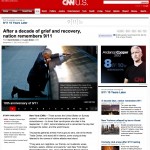
Screenshot By Mark Rosal
This morning Mark Rosal of Visual Gooodness (@visualgoodness) posted on their blog two screen shots of CNN’s website after it went down and came back online on September 11th, 2001. The attack on this country was 10 years ago. Can you believe that? Looking at the CNN website that Mark posted made me realize a couple things. First, I looked at where I was then and now. I remember being swept up in the sadness of the tragedy that day. Now, I’m getting married in less than a month. Second, I thought about how web technology and consumer technology as a whole has progressed. How much has changed for you personally and professionally in the last 10 years?
10 years ago we were just starting to recover from our hangover after the dot-com bubble burst. The idea of doing everything on the web was new. The great ancients Prodigy, CompuServe and AOL were still the common way America went “online”. Booking travel online was new and banking was years away. There were still a good deal of users on dial-up modems. Web technology was still in it’s infancy. Windows users are still the majority today but back then total was nearly 100%. The new advancement of Apple had just begun only four years prior when Steve Jobs returned. It might be hard to imagine that “God Jobs” [credit George Parker/AdScam] was never at the helm of the USS Apple but it’s true. Even OS X had only launched six months prior.
The first popular web browser, Mosaic was still being used along with Netscape and Internet Explorer. Firefox, Safari and Chrome had not yet been born. Opera was around but like today, people unfortunately do not use it. Wikipedia has a solid history of web browsers. In early 2000 I had assembled a multi-partition bootable PC with several operating systems and browser combinations that I had named Illuminati. I just remembered that I used the SuperHighway to print out a sticker that went on the CRT. Yes, a heavy cathode-ray-tube. No flat screens.
FutureSplash had just begun it’s new life as Macromedia’s Flash four years earlier. If you read the Wikipedia entry you’ll see that the Adobe machine has done a great job sweeping through Wikipedia and making sure that it says Adobe predominantly over Macromedia since the acquisition in 2005. At first it looked like they were re-writing history.
Web 1.0 was still figuring itself out. I had not yet been asked if I understood Web 2.0 in interviews. “New Media” begat “Interactive” which begat “Digital”.
There was no Facebook (or even MySpace). There was no YouTube and even though Google was in exsistence the idea of “googling” something had not entered into our lexicon.
The mighty iPhone that I switched to from my years of loyal Palm/Handspring support with Pilots and Trios was more than 6 years in the future.
The idea of sharing everything you do online was foreign. Believe it or not people enjoyed a degree of anonymity that the current online space could provide. There was no idea of being “social” online nor was it delivered by any media. The kids that are being hired today as experts by agencies or receiving millions for their startups, were most likely just starting high-school.
Obviously I’m a but of a history nerd. Especially when it comes to technology and it’s evolution and how people interact with it.
So if you were in the marketing/advertising mass-communication space in 2001 what were you doing with web technology?
Have you ever stopped to think about how far we have come and how integrated web tech is in our daily lives?
- Home 9/11/01
- Home 9/11/11
- Article 9/11/11
- Article 9/11/01
But this is nothing new…
In 1965, Gordon Moore (who would go on to co-found Intel a few years later) wrote an article where he laid out what would be known as “Moore’s Law“. He basically said computing power would exponentially grow every two years. Just look at what has happened even since the iPhones release in July 2007. We are living in a new world with modern day industrialists. Reminds me of the novels and even movies from the beginning of the last century like Fritz Lang’s Metropolis. When people feared that machines were going to replace the working man’s struggle.
9/11, advertising, history, technology, web tech


